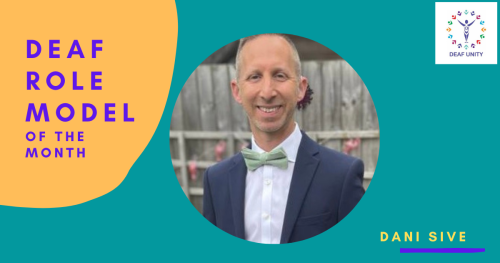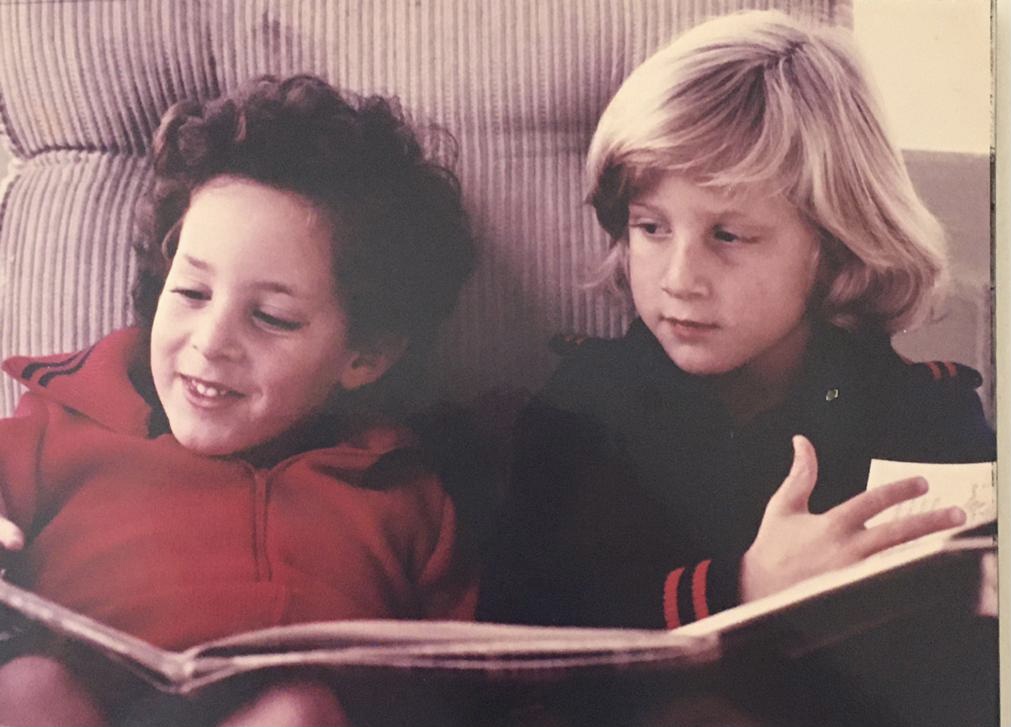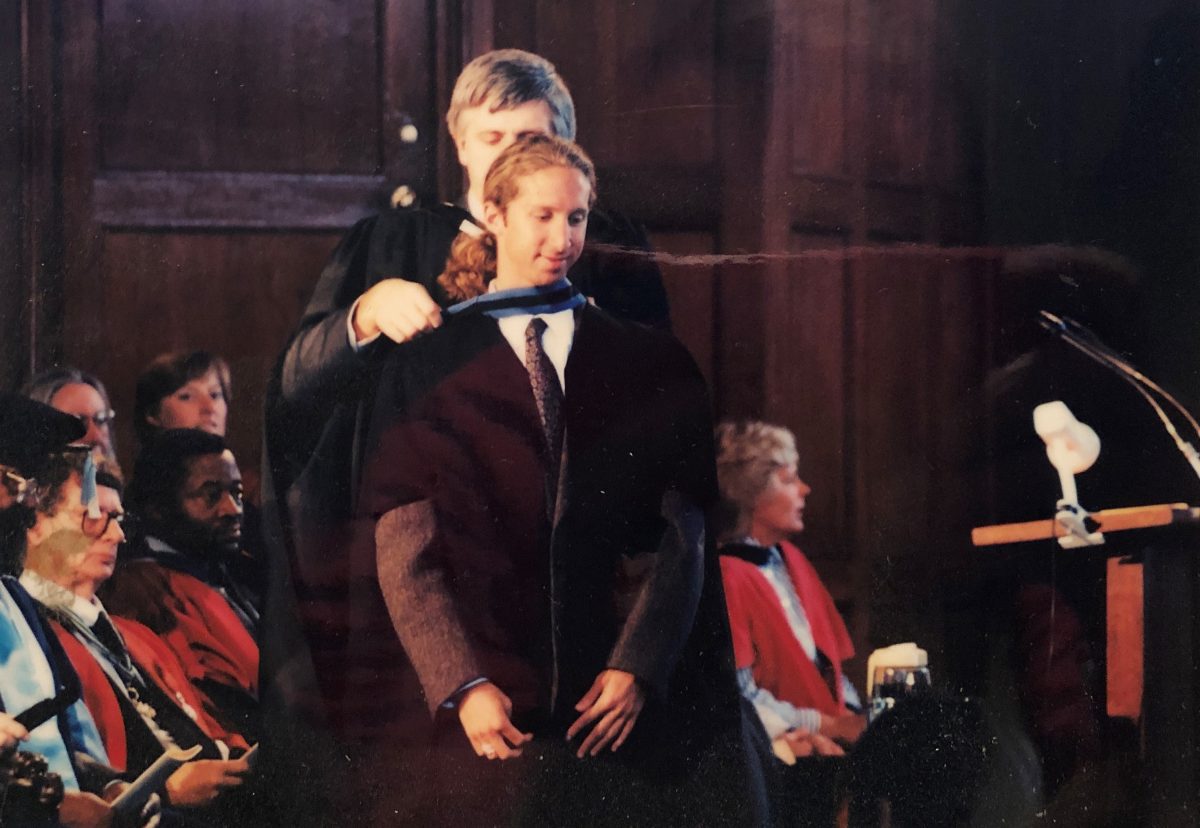
Each month we invite an inspirational or outstanding deaf role model to share their story. From what they’ve learnt, to what they wish they’d have known and their best deaf tips.
Our role model this month is a well-known face within Deaf Education: Dani Sive. Dani is the Headteacher at Frank Barnes School for Deaf Children in London and an active member of the British Association of Teachers of the Deaf (BATOD).
1. Hi Dani! Congratulations on being a Deaf Role Model – tell us about yourself.
I was born and bred in Cape Town, South Africa and grew up as the only deaf person in my family. I am one of a twin – my brother is hearing and now lives in the USA. My parents never treated me differently because I was deaf and had very high expectations of me growing up. They always made sure I was included in family life and conversations. I learnt to speak and communicate in English after I was given my first hearing aids as a very young child. My family has always been important to me and I know they are very proud of all my achievements and accomplishments. I grew up in a completely hearing world, and had a few deaf friends from primary school who also used spoken English. I had not met any Deaf adults growing up nor seen anyone use sign language until I was about 21.
2. Can you describe your deafness – how would you describe your ‘Deaf Identity?’
My parents realised something was different about me when my twin brother responded to loud sounds and I showed no response at all. I was taken to various doctors to find out what was ‘wrong’ with me until I was finally identified deaf at about 18 months old. I am profoundly deaf, with some residual hearing in my left ear so I wear hearing aids which I benefit from, but even less residual hearing in my right ear, so a hearing aid doesn’t offer any benefit. Throughout my childhood, I didn’t have a clear identity – I wasn’t deaf, but I wasn’t hearing either… I felt somewhere in between.

Dani with his twin brother
I grew up orally, but learnt basic sign language (South African Sign Language) as a young adult, aged 21, at a beginner’s course at university, and then learnt BSL very quickly through my work as a teacher when I moved to London in 1999. I embraced the Deaf community and discovered my newly-found Deaf identity through making Deaf friends and getting involved in Deaf events. I now have a strong Deaf identity that I am proud of, amazing Deaf friends and a wonderful Deaf husband. I am complete!
3. What was your experience of education and higher education as a deaf person?
I went to a special primary school for deaf children and was raised orally using spoken English, and then went on to a mainstream secondary school where I was the only deaf child in the school. I worked hard and was very confident, which is what probably helped me get by, but I know I probably missed a lot of information in class. I relied a lot on my best friend to fill me in and support me, and we are still good friends to this day.
I then went on to university to do a BA degree, majoring in English and Psychology at the University of Cape Town before I did a primary school teaching diploma for a year in 1998. I moved to London in 1999 as a young qualified primary school teacher where I began my career. I qualified as a Teacher of the Deaf at Leeds University in 2005. I enjoyed university and I know I struggle more than I did at school as I received less support – no note-takers or interpreters. I relied on my friends to take notes, and did a lot of reading to catch up on my coursework. The university gave me free photocopying as compensation for my lack of access!
4. Have you faced any obstacles or challenges from being deaf and how have you overcome these?
Because I was so confident and secure as a child, I don’t actually recall there being any obstacles for me growing up. I was determined not to let being deaf get in the way, and even learnt to play the piano, learn another language (French) and got the top grades at school, much to everyone’s amazement.
I do remember though, at high school, that I didn’t have as many friends as everyone else, and I couldn’t do the things that hearing people did like talk on the phone, follow a movie (no such thing as subtitles in those days!), or communicate with anyone and understand them. I also knew I couldn’t follow spoken conversation fully, but being very nosy I made a point of getting people to tell me what people were talking about or what was happening around me as much as I could. This was probably how I managed to overcome these challenges.
5. What inspired you to go into teaching?
Ever since I was in primary school, I always dreamed of being a teacher. I loved my school teachers and listening to them and I always felt they were interested in me and making sure I was part of the class, especially because I worked hard and did well. As a child, I always liked the idea of having a class of my own and being in control, telling the children what to do, marking their books and preparing lessons.
I wasn’t sure about teaching when I was in high school, or when I went to university, but after my BA degree, I started to seriously think about teaching again and did a teaching diploma, and re-kindled my old dream of taking up a profession in teaching as I loved school, and felt I could then teach kids to love school and learning, too.
6. What was your own experience of education like?
I have very positive memories of my own education from start to finish. I hated missing a day of school as I didn’t want to miss out on any learning. Of course, there were some subjects I liked more than others, but I was determined to do well and that meant working hard – making sure I read, revised and passed all my exams with high grades. My parents are well-educated and expected me to go to university and get a good job when I grew up. I think because I put in all the effort, my teachers were prepared to put the effort into teaching me and making sure I did well, so overall a very positive experience. 
7. When did you begin your career in UK and what was the experience like for you?
I moved to the UK in 1999 and started to look for teaching jobs through agencies. Back then I wanted to work with deaf children and had no idea about teaching children that used BSL. As soon as I started working with deaf children and started learning BSL I realised how accessible it was and how easy it was for me to pick up. I guess this was an innate natural language that I hadn’t yet at the opportunity to learn or use. I loved learning and using BSL and soon found this to be my preferred language for communication, and I preferred interacting with Deaf people.
8. What is the most rewarding part of being the headteacher of a deaf school?
I enjoy seeing children develop their confidence with a positive Deaf identity. I love seeing how the children thrive in a bilingual environment and seeing how everyone is so accepting of each other, no matter their skills, needs or abilities. I love my staff team and how everyone is so committed and dedicated to the work they do for the children. I also enjoy being part of every aspect of the school from governors meetings, to school business matters, to communicating with parents, making links with the community, dealing with staff and recruitment, to observing lessons and giving feedback, liaising with the Local Authority, and driving school improvement. No two days are the same, and there’s always something to do which keeps me busy! There are so many rewarding things about being the Headteacher!
9.How have you seen the field of deaf education change in the years of being a teacher?
I’ve seen more deaf teachers and teaching assistants take on roles in schools, who are amazing role models, and also seen them being promoted to higher roles. I’ve also seen more and more deaf children being mainstreamed due to the increase in cochlear implantation, but not really seen that deaf children are doing any better than they were 20 years ago.
10.What are your thoughts on the BSL GCSE being proposed and how can it be succesful do you think?
I think it’s a great idea and I hope it materialises. Having a BSL GCSE will raise awareness and the profile of BSL and hopefully see more young people, both deaf and hearing, learning BSL at school and developing Deaf awareness to allow Deaf people to have better access and communication opportunities and live lives as equal citizens in society.
In order to be successful, we need to see more Deaf people qualified to teach BSL in schools, to ensure good quality BSL teaching at a high standard.
11.Would you encourage young deaf people to pursue a career in teaching – why?
Teaching isn’t necessarily for everyone. I think Deaf people should be able to choose whatever career they wish following their interests, but teaching can be very rewarding as a profession. It can also be very frustrating when children don’t get the right start in life, such as acquiring good language skills, which impact on their learning and development significantly. I think it’s important that we have more deaf teachers because they are valuable role models for deaf children, and having a lived experience of being deaf makes them some of the best educators with high expectations for achievement.
12.What qualities do you think make a good teacher?
Having high expectations with a ‘can-do’ attitude. Being positive and always believing that children can and will succeed. A good teacher needs to be reliable, accountable, committed and creative! Someone who is caring and understanding is essential too.
13.What are your hopes and aspirations for deaf education in the future?
I’d like to see the choice between “speech OR sign” changed to “speech AND sign”, and giving Deaf children the opportunity to learn both BSL and English in a bilingual environment, and then give them chance to use both languages fluently and with confidence. I’d like to see language deprivation in deaf children addressed and reduced or removed, which can be achieved through a bilingual approach and early access to both sign and speech.
14.Why do you believe in the bilingual approach employed at Frank Barnes School?
I believe that the bilingual approach works for deaf children because BSL is a natural language for deaf children to develop their cognitive, academic and social skills as well as develop their identities as young Deaf people, while learning English as a second language for literacy skills – reading, writing and speaking/listening. Unfortunately, so many deaf children arrive at school with very limited language and poorly developed language skills and aren’t ready to access the curriculum at an age-appropriate level, which is why it’s vital for children to have access to BSL and English in the Early Years to achieve better outcomes. My belief can be supported by a growing body of research studies that show early exposure to sign language at young age is a strong predictor of deaf children’s literacy skills in English.
Furthermore, I have seen first-hand that young deaf children with access to both BSL and English do better academically, socially, emotionally and linguistically.
15. Do you think there is a link between what you do at Frank Barnes and the wider Deaf Community?
Yes, very much so, we value and recognise the diversity of our school community in that we bring representations of people from different backgrounds by inviting them to our school. We are very proactive in organising annual Deaf events such as our BSL Celebration Day, BSL Recognition Day, Deaf Festival Week and our annual Christmas performance where we invite and involve deaf children across the country to join us. We also invite different members of the Deaf community far and near to come in to school and talk to the children as role models, which supports our curriculum topics. We have attended several conferences nationally (e.g. BDA and BATOD) and internationally (e.g. World Federation of the Deaf, WFD and ICED) to discuss the implications of bilingual education in deaf children.
We also have strong links with organisations such as the BDA, NDCS, Sign Bilingual Consortium, CRIDE, British Deaf History Society, etc. which all engage with the Deaf community or Deaf education to some extent.
16. Who inspires you and why?
I don’t really have any one specific person that inspires me. I take inspiration from different people in different ways. These are people close to me like my Deaf husband, or my parents, who have taught me much in life and how to be proud of who I am and what I’ve achieved; or others like strong leaders like Nelson Mandela, the late president of my birth country, who fought for equality and to treat others with respect in the face of adversity.
17. What ways do you think hearing people can be allies to the deaf community? Any DOs and DON’Ts?
Hearing people should encourage and support Deaf people to further develop their skills and knowledge to take on leadership roles in range of professions; they should listen to the Deaf community and acknowledge their needs and support them to achieve their goals.
Hearing should ideally not take on roles that a Deaf person should be given the opportunity to do, e.g. take on the acting role of a deaf character, or take on leadership roles in a Deaf-led organisation or deaf-related research projects that focuses on academic and social development in deaf children, etc.
18. 3 top tips for deaf people?
- Be open-minded!
- Be resilient and think positive!
- Deaf CAN, no such thing as Deaf CAN’T!
To learn more about the bilingual approach used at Frank Barnes, check out our Deaf Futures interview with Dani here. To read more inspirational role model interviews, take a look here.
Looking for more support? We’ve made it our mission to improve the lives of deaf people everywhere. Check out Deaf Unity’s projects to find out what we can do for you. If you’d like to get in touch, contact us here.
